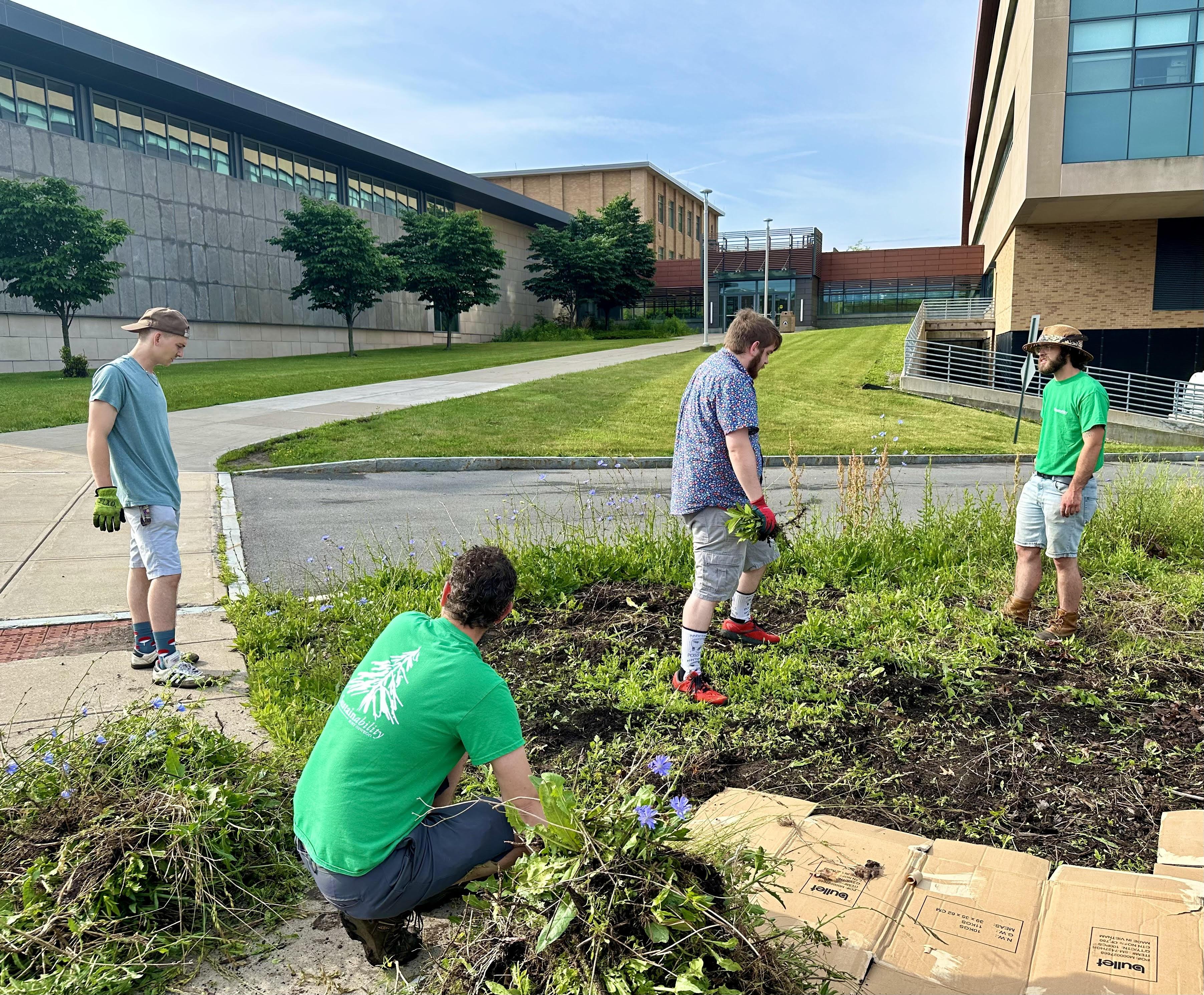A number of initiatives and dedication to continuous improvement recently earned SUNY Oswego the prestigious Gold STARS (Sustainability, Tracking, Assessment and Rating System) status from AASHE, the Association for the Advancement of Sustainability in Higher Education. Notable projects include the Permaculture Living Laboratory campus garden, here tended to, from left, by student Maxon Ali, Sustainability Director Kate Spector, student Dan Griffin and Sustainability Coordinator Jon Mills.
Campuswide efforts and continuous improvement recently earned SUNY Oswego the coveted Gold STARS (Sustainability, Tracking, Assessment and Rating System) status from AASHE, the Association for the Advancement of Sustainability in Higher Education.
This achievement establishes SUNY Oswego as a leader in higher education with sustainable practices, said Mitch Fields, associate vice president of facilities services. “It also places Oswego in the company of elite institutions that have also demonstrated a continuous record of achievement in sustainable practices,” he noted.
“It definitely continues to demonstrate our commitment to environmentally friendly and responsible practices,” said Sustainability Coordinator Jon Mills, who helped prepare the application.
The self-assessment process that comes with submitting the volunteer STARS report is important in terms of seeing where efforts are succeeding and what areas might need improvement.
“The amount of programs that we’ve created from looking at what we can do better is a big part of earning this Gold status,” Mills said.
The report particularly noted success in programs such as the composting initiative, Maple on Tap, BikeShare and the community garden, also known as the Permaculture Living Laboratory.
For the composting project, which has garnered multiple awards, the Sustainability Office partners with the university’s Auxiliary Services to divert food-related waste to the Oswego County Division of Solid Waste to become reusable compost. To date, the effort has diverted more than 100,000 pounds of food-related waste from landfills and incinerators as a green composting alternative.
Maple on Tap, another Sustainability Office-Auxiliary Services partnership, coordinates students and employees collecting hundreds of gallons of sap on university-owned land which became around 22 gallons of maple syrup, served at a community breakfast and available for sale.
BikeShare offers free semester-long loans to any campus member wishing to bike to classes or town instead of using any fueled transportation. The program saw great demand for its 80 bikes, with efforts underway to add more to the fleet.
The on-campus Permaculture Living Laboratory is an educational and beneficial ecosystem used to grow food and other forms of medicinal and aesthetic vegetation to encourage campus members to get involved with gardening and wellness benefits from nature.
“We have so many students learning about and getting involved in sustainability and stewardship,” Sustainability Director Kate Spector said. “We can see that they are going to be part of the solution for their own generation as well as passing it along to future generations.”
Campuswide contributors
“We have undertaken many initiatives since our last assessment," Fields said. "Energy conservation, waste reduction, education and community leadership can be counted among the more prominent achievements. Actions deserving acknowledgment are the print reduction effort led by the Purchasing Office, the campus-produced maple syrup program and food waste reduction initiatives done in collaboration with Auxiliary Services, educational programs developed with Academic Affairs and the overarching effort by Facilities Services to incorporate sustainable practices in daily operations.”
Mills noted that the Major Projects Office in Facilities Services is another key player in the continuing improvement process.
“The Office of Major Projects has been great in thinking outside the box about what we can do with our equipment and facilities, and being part of the effort to push ourselves to keep our emissions down,” Mills noted.
The winter savings initiative, of moving more work from campus to home and other energy-reduction strategies, was a crucial contributor in reduction of energy use and emissions, Mills said.
But it takes a village to earn this prestigious rating, and “big and little things are equally as valuable,” Mills said. “Everybody plays a part.”
Mills also credited a system of creating building ambassadors, having a person in each building who can monitor building operations and use of energy, and who can regularly check in with the Sustainability Office and the Campus Environmental Action Committee with suggestions and observations. This committee includes faculty and staff who want to be aware of and part of the efforts of university-wide sustainability.
“Being transparent is really important for us, especially in sustainability where it is a collaborative effort, a community effort,” Mills said. “I think the students seeing what we’re doing helps enormously.”
“This work is important on so many levels,” Fields said. “First and foremost is to safeguard the environment for future generations. This institution's purpose is to educate and prepare individuals to become good citizens and future leaders. It is important that SUNY Oswego sets a good example for both the university and the greater Oswego community.”
About STARS and AASHE
STARS is a transparent, self-reporting framework for colleges and universities to measure their sustainability performance. The framework encompasses long-term sustainability goals for already high-achieving institutions, as well as entry points of recognition for institutions that are taking first steps toward sustainability.
AASHE is a top organization that empowers higher education faculty, administrators, staff and students to be effective change agents and drivers of sustainability innovation. The organization works with and for higher education to ensure that the world’s future leaders are motivated and equipped to solve sustainability challenges.




